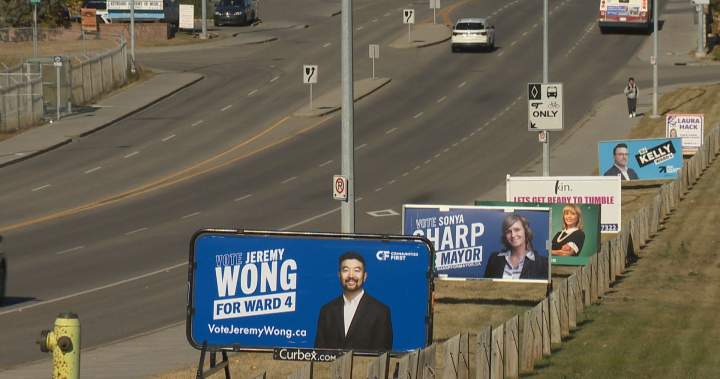A week after Calgary’s municipal election, there remain questions around the future of the local political parties established ahead of this year’s vote.
Three municipal political parties emerged in Calgary after provincial legislation introduced last year allowed parties as a pilot project in Calgary and Edmonton.
“Voters did not wholeheartedly reject political parties in municipal politics, some party candidates were elected. But also they didn’t wholeheartedly embrace political parties,” said Jack Lucas, a professor of political science at the University of Calgary.
Six of Calgary’s 14 incoming city councillors were affiliated with a political party during the campaign, including four with Communities First and one each for The Calgary Party and A Better Calgary Party.
Eight elected and re-elected candidates as well as Calgary’s mayor-elect, Jeromy Farkas, ran as independents.
“I have to work alongside a council that was chosen by Calgarians and I’m able to do that because I ran as an independent,” Farkas said during this victory speech last week.
Ward 10 Coun. Andre Chabot and Ward 13 Coun. Dan McLean were re-elected under the Communities First banner, along with party candidates Kim Tyres elected in Ward 1 and Rob Ward elected in Ward 11.
According to Chabot, the future of the Communities First party will be decided by its members with the elected officials staying out of it.
“We agreed as part of our platform that after the election we’d immediately dissolve the party,” Chabot said.
“That’s going to be completely independent of the elected officials because we’ve all agreed to recuse ourselves from being involved with the party on a go-forwards basis.”
Get daily National news
Get the day’s top news, political, economic, and current affairs headlines, delivered to your inbox once a day.
That promise is one of the reasons Ward said he decided to run for the party, as candidates would be “allowed to act as independents once elected.”
“At the end of the day, I’m going to represent Ward 11 residents first and vote accordingly,” he told Global News.
McLean, meanwhile, said he’d “like to see party lines disappear” once they’re sworn in as the next city council, and noted there won’t be any “caucusing or party whips” amongst those elected from the party.
“Nobody has a clear majority. Maybe that’s going to work out for the better,” he said.
The future of The Calgary Party remains unclear, according to Ward 4 councillor-elect DJ Kelly, the party’s sole candidate elected.
“I don’t think there’s much of a difference between a party of one or an independent,” Kelly told reporters. “I’m confident I can work with everyone around the council table, for sure.”
The other “party of one” on council is Ward 12 councillor-elect Mike Jamieson, who ran for the A Better Calgary Party, and was elected by just a 59 vote margin over runner-up candidate Sarah Ferguson of The Calgary Party.
According to Roy Beyer, executive director of the A Better Calgary Party, Jamieson will be the “face of the party,” as the party apparatus continues to operate and prepare for the next municipal election in 2029.
“For conservatives, this is the only mechanism by which we can consistently avoid vote splitting,” Beyer told Global News.
“We plan on being organized at every ward level, having a true nomination process, having properly-trained candidates and making sure we’ve got the best of the best nominated to go into the next election.”
Parties can continue to exist and operate following the election, according to the Ministry of Municipal Affairs, provided they meet all requirements set out under the regulations.
Those regulations forbid parties from raising or spending money between election years with bans on campaign expenses between Jan. 1, 2026 and Dec. 31, 2027.
“In order to build a really strong reputation akin to the reputation that provincial or federal parties have, these parties need to stick around, they need to remain active, continue to communicate with voters,” Lucas said.
“It seems unlikely that’s going to happen.”
Both McLean and Chabot had mixed feelings about the municipal parties pilot, with Chabot saying he didn’t think it was a successful test.
While the elected party candidates are vowing to govern as independents, Lucas expects some partisan voting behaviour on the next city council.
“A lot of that has more to do with patterns of underlying agreement and disagreement and less to do with anything like party discipline or coordination,” Lucas said.
“That’s what we see in Vancouver and Quebec, and other places that have political parties at the municipal level.
As an example, Lucas said he found McLean and Chabot voted together 88 per cent of the time during the last council term, before they were affiliated with a party, because “they tend to agree on policy.”
According to the Municipal Affairs minister’s office, after each election the ministry conducts a regular review of the Local Authorities Election Act “to identify potential improvements to ensure local election processes remain fair, transparent, and consistent across the province” with parties expected to be part of that review.
© 2025 Global News, a division of Corus Entertainment Inc.


